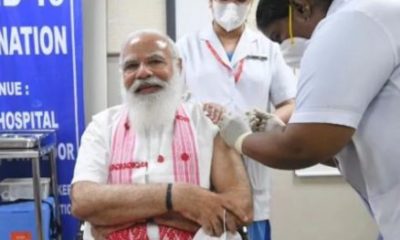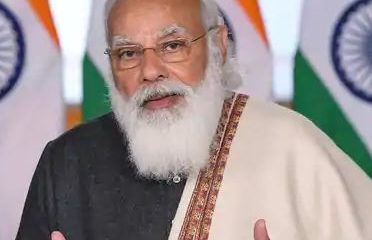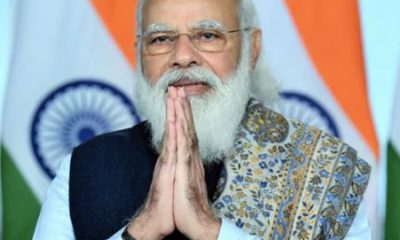World
At dinner with Obama,Modi warns about state actors abetting terrorists

 Washington:Prime Minister Narendra Modi warned global leaders from over 50 nations gathered here to discuss nuclear terrorism that state actors working with nuclear traffickers and terrorists present the greatest risk.
Washington:Prime Minister Narendra Modi warned global leaders from over 50 nations gathered here to discuss nuclear terrorism that state actors working with nuclear traffickers and terrorists present the greatest risk.
“Terrorism is globally networked. But, we still act only nationally to counter this threat,” he said at a working dinner hosted by President Barack Obama on Thursday night to kick off the two-day Nuclear Security Summit.
Obama, who is hosting his fourth and last such summit to discuss how to prevent terrorists and other non-state actors from gaining access to nuclear materials, was flanked by Modi on the right and Chinese President Xi Jinping on the left.
Modi, who has come to the summit meeting in the shadow of Brussels and Lahore terror attacks, from the Belgian capital said, “Brussels shows us how real and immediate is the threat to nuclear security from terrorism.
“Terror has evolved. Terrorists are using 21st century technology. But our responses are rooted in the past,” he said asking the leaders to focus on three contemporary features of terrorism.
“First, today’s terrorism uses extreme violence as theatre. Second, we are no longer looking for a man in a cave, but we are hunting for a terrorist in a city with a computer or a smart phone.
“And third, State actors working with nuclear traffickers and terrorists present the greatest risk.”
In what was seen as an unmistakable reference to Pakistan, Modi also gave a call to drop the notion that terrorism is someone else’s problem and that “his” terrorist is not “my” terrorist.
“Nuclear security must remain an abiding national priority,” Modi told the world leaders. “All states must completely abide by their international obligations.”
“Without prevention and prosecution of acts of terrorism there is no deterrence against nuclear terrorism,” he said.
“But the reach and supply chains of terrorism are global, genuine cooperation between nation states is not,” lamented Modi.
India has long asked Islamabad to take action against Pakistan-based terror groups like Lashkar-e-Taiba(LeT) and Jaish-e-Mohammed (JeM), responsible for the Mumbai and Pathankot terror attacks. But the perpetrators of the Mumbai attacks remain unpunished.
On the eve of the summit, India’s National Security Advisor Ajit Doval discussed counterterrorism cooperation, including against LeT and JeM, with his US counterpart Susan E. Rice at the White House.
In a meeting with Doval, Secretary of State John Kerry praising “India’s record of being a leader, of being responsible,” told him “India has a very important role to play with respect to responsible stewardship of nuclear weapons and nuclear materials”.
“And it is particularly important right now at a time when we see in the region some choices being made that may accelerate possible arms construction, which we have serious questions about,” he had said in another reference to Pakistan.
The US has time and again expressed concern at Pakistan’s deployment of weapon-grade nuclear weapons.
“Our concerns regarding the continuing deployment of battlefield nuclear weapons by Pakistan relate to a reality of the situation,” Rose Gottemoeller, under secretary of state for arms control and international security, told reporters on the eve of the summit.
“When battlefield nuclear weapons are deployed forward, they can represent an enhanced nuclear security threat,” she said.
However, Pakistan Foreign Secretary Aizaz Chaudhary on Thursday claimed that its “modest” nuclear programme was “essentially for its defence and not to threaten anyone”.
“Pakistan’s nuclear installations are not only secure but the world also acknowledges that they are,” he told reporters at the Pakistan embassy here. “India, on the other hand, has an ambitious nuclear programme.”
World
Lockdowns in China Force Urban Communities to Defy Censorship and Vent Frustration Online

Shanghai’s rich middle class is leading a wave of online dissent over the strict and prolonged lockdowns imposed in various parts of the country. Chinese internet censorship is struggling as patience is wearing thin in many urban centers, coming up with creative forms of online protests.
Social Media Posts Revealing Lockdown Tension in Shanghai
Drawn-out lockdowns are nothing new in China as authorities insist with the nation’s zero-Covid policy since the start of the pandemic. Currently over This time around, however, metropolitan areas like Shanghai are increasingly difficult to keep quiet, given that its more than 25 million residents have seen weeks of total isolation along with food shortages and many other service interruptions.
Dozens of towns and reportedly over 300 million Chinese citizens have been affected by lockdowns of different severity. As expected, urban netizens have been most outspoken over their difficulties by finding creative ways to get around state censorship and bans placed on topics, news comments and spontaneous campaigns.
Shanghai residents have been using mobile proxies and hijacking seemingly unrelated hashtags to talk about healthcare issues, delivery failures and the overall severity of their situation. The “positive energy” that the Chinese government wants to transmit during the recent prolonged series of lockdowns does not come naturally to those counting food supplies and online censors are working hard to filter words, trending topics and undesired social media sharing.
WeChat groups and message threads are under constant monitoring. Posts questioning the zero-Covid approach have been quickly deleted, including by leading Chinese health experts like Dr. Zhong Nanshan. Video footage is soon censored and protests and investigations are quickly made to disappear.
Where this has not worked, officials have exposed banners with warnings and outright threats like “watch your own mouth or face punishment”, while drones have been patrolling the city skies. Yet, if anything, this has led to further tensions and unspoken confrontation with Shanghai’s educated and affluent middle class.
Creative Online Solutions Harnessing Civic Energy
Announcements by Chinese social media that they would be publishing the IP addresses of users who “spread rumors” have not helped either. Tech industry research has shown that much of Asia’s tech-savvy population has a habit of using mobile proxies and other privacy tools, quickly finding workarounds to browse the internet freely and talk to the world about the hottest topics.
The sheer volume of forbidden posts is already a challenge for the very censorship system, experts explain. Unable to track all trending hashtags, state workers overlook topics that speak about the US, Ukraine or other popular news. Linking human rights elsewhere to their situation, Chinese online dissidents establish their informal channels and “hijack” the conversation to share personal or publicly relevant information about the Covid suppression in their town.
Sarcastic and satirical posts still dominate. Others hope to evade the censors by replacing words from famous poems or the national anthem. One thing is certain – social media, when harnessed with the right creativity, has proven its ability to mount pressure on the government in even some of the most strictly controlled tech environments like China.





















